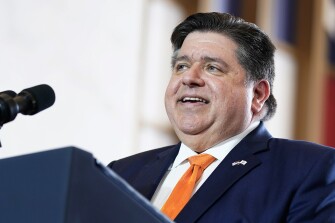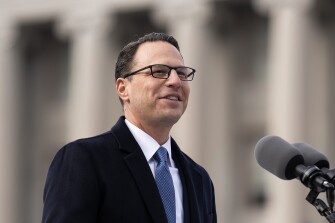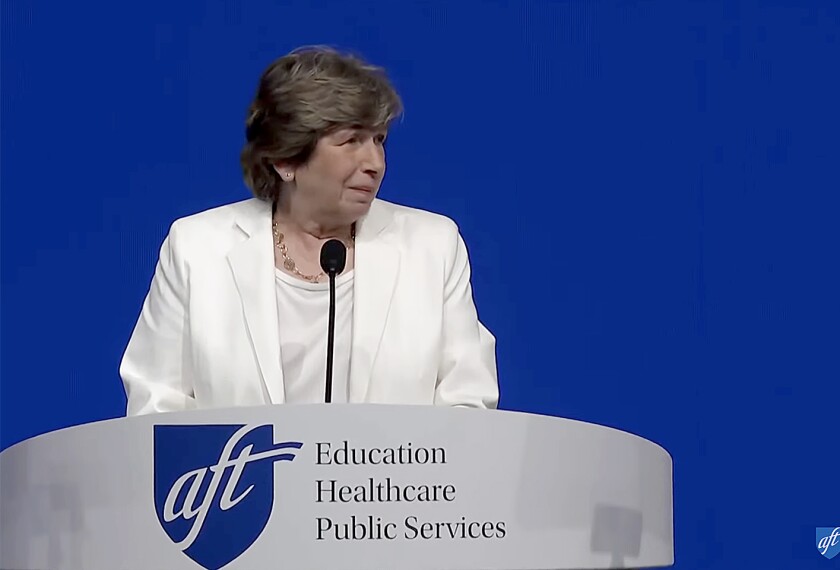Updated: This article has been updated to note that North Carolina Gov. Roy Cooper withdrew from consideration for the No. 2 spot on the Democratic presidential ticket.
Vice President Kamala Harris is days away from choosing her running mate in the 2024 presidential election, and a number of her top contenders have extensive K-12 policy records.
So far, the vice president and likely Democratic nominee’s leading candidates for the job are elected officials who have shown an ability to win over some Republican-leaning voters in swing states or deep red areas. Already Harris’ campaign has contacted at least 12 prospects, including governors, members of Congress, and presidential Cabinet members, according to CBS News.
They include a swing-state governor who has been open to vouchers and private school choice, a U.S. senator with a personal connection to gun violence, and a former high school teacher and football coach.
Last week at the American Federation of Teachers convention in Houston, Harris used her first campaign speech focused on education to push back against conservative efforts to ban books from school libraries and laws championed in GOP-led states that restrict instruction on race, gender identity, and sexuality. She also criticized Project 2025, the conservative policy agenda developed by the Heritage Foundation that proposes eliminating the U.S. Department of Education and a key federal fund for schools. Harris didn’t use the address to introduce any new policy proposals.
Expect a Harris running mate to reinforce many of those statements on the campaign trail. Here’s what we know so far about Harris’ pool of potential running mates, listed in alphabetical order, and their records on K-12 policies.

Kentucky Gov. Andy Beshear
Beshear, a Democrat who has won three statewide elections in a deeply Republican state (two gubernatorial races and one to serve as the state’s attorney general), has made investments in public education and opposition to school choice a mainstay of his policy agenda. He called for teacher pay raises and universal pre-K in his victory speech last November after he won a second term as governor.
This November, Kentuckians will vote on a proposed constitutional amendment that would allow the state to direct public funding to schools outside the traditional public school system, opening the door to policies that provide families with public money to pay for private school tuition.
Kentucky courts have ruled that Republican-backed laws to allow charter schools and provide tax credits to donors who underwrite private school scholarships are unconstitutional. Beshear has been a vocal opponent of the proposed amendment, telling reporters he will do everything he can to ensure it’s defeated, according to the Associated Press.
“Public dollars should only go to public schools, period,” Beshear said, according to the AP.
Beshear has also used his time as governor to push for major funding increases for K-12 schools. In 2023, he proposed what he labeled an “education first” biennial budget, including $1.1 billion to provide an 11 percent pay raise for teachers and other school personnel over two years. That budget didn’t pass as proposed, however, as the Kentucky general assembly—in which Republicans hold veto-proof majorities—ultimately axed the teacher pay raise.
Beshear also selected Jacqueline Coleman, a former public school teacher and coach, as his running mate in his gubernatorial races. She is now Kentucky’s lieutenant governor.

Transportation Secretary Pete Buttigieg
Although his current position does not have much of a direct impact on K-12, Buttigieg has been a vocal supporter of raising teacher pay and increasing funding for public schools.
During his 2020 presidential campaign, in which he faced both Harris and President Joe Biden in the Democratic primary, he was a vocal critic of then-U.S. Secretary of Education Betsy DeVos. DeVos is “somebody who, in my view, is actively undermining the very purpose of the Department” of Education, he said in an interview with Education Week.
Buttigieg said in 2020 that he would have steered the Education Department to focus on “supporting the development of teachers as a professional class that gets the same regard as a lot of other professions in this country,” largely through teacher pay raises and additional public school funding.
He also called for “considerably more oversight” of charter schools, adding teacher-diversity requirements to the Elementary and Secondary Education Act, and having standardized-test results hold less weight in teacher evaluations.

North Carolina Gov. Roy Cooper
Update: Cooper withdrew from consideration to be Harris’ running mate on Monday night.
Cooper, another Democratic governor of a state where the GOP holds veto-proof legislative majorities, has been a vocal opponent of private school choice, which North Carolina Republicans have dramatically expanded.
Cooper, who’s finishing his second term in office, objected to a Republican measure last year that made vouchers universally accessible to families in North Carolina, allowing them to spend public money on private school tuition. The expansion was part of a budget that Cooper allowed to become law without his signature.
This year, Republicans in North Carolina have debated adding nearly $300 million to the voucher program to address a waitlist for the scholarships that resulted from lawmakers removing income limits. Cooper, however, has called for a moratorium on expanding the program.
“Republican legislative leaders are promising to give away hundreds of millions more just to make sure that the wealthier North Carolinians can pick up their government checks for children that they already have in private schools,” Cooper said at a press conference, according to North Carolina Public Radio.
Last year, Cooper declared North Carolina public schools were facing a “state of emergency” due to the then-proposed voucher expansion, a parents’ bill of rights that restricts instruction on gender identity and sexual orientation that Cooper later vetoed, and thousands of teacher vacancies.
“It’s clear that the Republican legislature is aiming to choke the life out of public education,” Cooper said in a special address in May 2023.
Like Beshear, Cooper has called for teacher pay increases. His proposed 2024 budget, which is unlikely to pass the Republican-dominated legislature, includes an average 8.5 percent teacher pay increase.
Cooper’s administration has also overseen the North Carolina Early Childhood Action Plan, an initiative started in 2019 that uses a number of funding streams to supplement early-childhood teacher pay and gives preschool teachers more career pathways through apprenticeships and credit toward higher education degrees.

Arizona Sen. Mark Kelly
K-12 education has not been a major focus for Kelly, who has served in the U.S. Senate since 2020 and invested much of his policymaking effort on the military, energy and natural resources, the environment, and infrastructure.
The former NASA astronaut and U.S. Navy combat pilot has sponsored one bill and co-sponsored 23 bills related to education throughout his time as senator.
His co-sponsored bills include the Head Start for Our Future Act, which would add child development and early learning as potential services college students could perform as part of the federal work-study program; the Loan Forgiveness for Educators Act, which would expand eligibility for loan forgiveness to early-childhood educators and program directors and school leaders serving in high-need schools; and the Focus on Learning Act, which would direct the Education Department to study how cellphones and other mobile devices affect elementary and secondary schools and establish a grant program for schools to create phone-free environments.
None of the three bills has made it out of the Senate.
If Harris chooses Kelly as her running mate, she would elevate someone with a personal stake in debates over gun safety and gun control.
Kelly’s wife, former U.S. Rep. Gabby Giffords, was shot in the head by a gunman who killed six people and injured 12 others at an event in Tucson, Ariz., in 2011. Following the mass shooting at Sandy Hook Elementary School in Newtown, Conn., the next year, Giffords and Kelly co-founded an organization to campaign for gun-safety laws.
A push for gun-control measures from Kelly would dovetail with Harris’ agenda. In her July 25 AFT speech, she highlighted her support for an assault weapons ban.
“We want to ban assault weapons, and they want to ban books,” Harris said. “Can you imagine?”

Illinois Gov. J.B. Pritzker
Education was a major part of Pritzker’s 2023 state budget, which included an increase of over $1 billion for K-12 schools. As governor, he’s also signed laws raising minimum teachers’ salaries and requiring schools to implement career exploration and development programs for students in grades 6-12.
Pritzker also signed a sweeping education law in 2021, which requires schools to better prepare students in computer literacy, laboratory science, and foreign languages.
Pushing back against GOP-led measures across much of the country, the Illinois law also expands required Black history curriculum to include lessons on the conditions leading to slavery and the Civil Rights Movement and establishes an Inclusive American History Commission, a Professional Review Panel under the state board of education, and a Whole Child Task Force, which all look at ways to make schools more equitable and improve students’ well-being.
He also signed a bill last year that penalizes libraries that ban books.

Pennsylvania Gov. Josh Shapiro
Standing apart from his potential competition for Harris’ running mate pick, Shapiro does not oppose private school choice. Last summer, the Pennsylvania governor initially supported a $100 million voucher program that would help parents pay for private school tuition but backed down during a budget stalemate amid pressure from Democrats in the state’s lower legislative chamber.
That position prompted a network of over two dozen public education advocacy groups to publish a letter to Harris on July 24 asking that she not choose Shapiro as her running mate.
The letter argues that the policies Shapiro has supported mirror those outlined in Project 2025.
The letter recommends that Harris choose someone “who unabashedly supports and defends public education,” such as
Cooper, Beshear, or Minnesota Gov. Tim Walz, who the letter describes as “vocal champions for public education in their states.”
But Shapiro’s background supporting school choice isn’t the only item on his track record in education. The governor recently negotiated a 2024-25 budget with an increase of over $1 billion for K-12 education, which includes money for universal free breakfast for the state’s 1.7 million students.
The budget boosts public education funding after a judge ruled in 2023—just weeks after Shapiro took office—that Pennsylvania has failed to adequately fund its schools so that all students can access a high-quality education.

Minnesota Gov. Tim Walz
Walz is the only candidate on the list of Harris’ prospective running mate picks who is a former teacher. The second-term governor was a social studies teacher and football coach at Mankato West High School in Mankato, Minn., where he worked before running for the U.S. House of Representatives in 2006. Walz’s wife, Gwen, taught at the school, too.
As governor, Walz signed a sweeping education law last year that increases spending for public schools by $2.3 billion and expands unemployment insurance eligibility to cover teachers and other school staff who work hourly jobs over the summer months. The law received praise from the state’s teachers’ union and other education advocates, according to the Minnesota Reformer.
In 2023, Walz also signed the Minnesota Free School Meals law, making school breakfast and lunch free for all students regardless of income.
Recently, Walz criticized Trump’s running mate, Ohio Sen. JD Vance, and other Republicans for “destroying” rural America “telling us what books to read.”
“I think what Kamala Harris knows is bringing people together around the shared values—strong public schools, strong labor unions, health care that’s affordable and accessible,” Walz said in the July 23 interview on the MSNBC show “Morning Joe.”
In that interview, he also criticized private school choice programs, arguing they don’t help rural areas.
“They talk about private schools. Where in the heck are you going to find a private school in a town of 400?” Walz said. “Those are public schools. Those are great teachers that are out there making a difference and giving us an opportunity to succeed.”
Other options
The Harris campaign has also reached out to prospective running mates who appear less likely to secure the No. 2 spot on the Democratic ticket, according to extensive national reporting. They include:
- Maryland Gov. Wes Moore, who has signed bills aimed at combating teacher shortages and that pay student teachers
- Michigan Gov. Gretchen Whitmer, who signed a $24.3 billion education budget in 2023 that increased per-pupil funding by 5 percent. Whitmer, however, has said she plans to finish her second term as governor, which runs through 2026.
- U.S. Secretary of Commerce Gina Raimondo, who was the first female governor of Rhode Island and successfully pushed to grant high school graduates two years at the state’s community colleges tuition-free.
K-12 in a 2nd Trump Term: Project 2025, a detailed policy agenda assembled by allies of the former president, outlines plans to dramatically scale back the federal role in education. Here’s how.
Kamala Harris’ Education Record: The vice president has touched education policy since her days as a prosecutor. What she’s said and done on K-12.
The GOP’s 2024 Education Platform: We break down the party’s nine key education positions in its official platform. Here’s what the party has in mind.
‘God Knows We Don’t Pay You Enough': Kamala Harris rallied teachers in one of her first campaign speeches. Here’s what she said.







